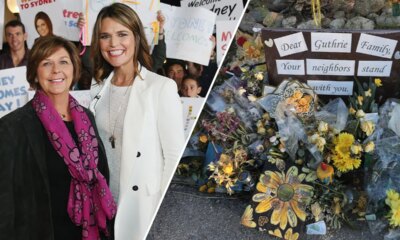Entertainment
Elwood Edwards, voice of the ‘You’ve got mail’ AOL email greeting, dies at 74

Elwood Edwards, a media multihyphenate who voiced AOL’s iconic greeting “You’ve got mail,” has died.
Edwards died Tuesday at age 74 in New Bern, N.C., after a long illness, his former employer, Ohio NBC affiliate WKYC, confirmed. According to the television station, he died the day before his 75th birthday.
During his decade-long stint at WKYC, Edwards worked as a “graphics guru, camera operator, and general jack-of-all-trades,” the station said, “yet it was a somewhat random opportunity in 1989 that earned him international fame.”
That year, Edwards recorded the four short phrases — including “You’ve got mail” — that he had “a certain amount of trouble trying to escape” for the rest of his life, he joked in 2012.
Thirty years ago, Edwards’ wife, Karen, was working as a customer service representative at Quantum Computer Services, AOL’s predecessor company, when she overheard then-chief executive Steve Case say he needed a voiceover actor for a new project.
“I had an idea. Why not make the service more personal by adding the voice of a person?” Case wrote in his 2016 book “The Third Wave: An Entrepreneur’s Vision of the Future.” Karen Edwards promptly volunteered her husband’s services.
“I’d never met him, and didn’t know what his voice sounded like. But I figured it would at least be a good prototype, a sample we could play for other voiceover actors when we started auditions,” Case said.
The executive scribbled a few phrases — “Welcome,” “You’ve got mail,” “Files done” and “Goodbye” — onto a Post-it note and handed them to Karen, who promised recordings by the next day.
Edwards’ voice “couldn’t have been more perfect,” Case recalled in his book. “It was disarmingly friendly, like the voice you’d expect from a stranger who offered to carry your grandmother’s groceries. The second I heard it, I knew we weren’t going to be auditioning anyone else.”
Within a month, AOL was mailing CDs to millions of people nationwide, each containing upgraded software and a message from Elwood Edwards — who was paid a mere $200 for the homemade recordings.
“I didn’t really think anything of it at the time,” Edwards said in a 2019 episode of the “Twenty Thousand Hertz” podcast. He had worked in broadcasting since high school, so hearing his name come out of a speaker was “nothing new.”
“I don’t think anyone had any idea what it would become,” he said.
Edwards went on to lend his voice to other projects, including promotions for the 1998 romantic comedy “You’ve Got Mail” and a 2000 episode of “The Simpsons.” In 2015, he appeared on “The Tonight Show Starring Jimmy Fallon,” and after he recited his signature phrase, Fallon told the audience, “That’s worth the price of admission, right there. That’s enough.”
The former broadcaster never received any residuals for his AOL voice work, he told Inside Edition in 2016, two years after his retirement from WKYC. He wasn’t able to find much voiceover work after the gig either, he told Culture Honey later that year, because he was “pigeonholed as the ‘You’ve got’ guy, and nothing ever really came of that.”
Still, he said on “Twenty Thousand Hertz,” being the voice of AOL was immensely gratifying, as was being recognized for it over the years.
“Our world is full of people who were in the right place at the right time, and I’m glad to be one of those,” he said.
Elwood Hughes Edwards Jr. was born on Nov. 6, 1949, in Glen Burnie, Md., and began his broadcasting career in high school in North Carolina.
“He started out as a teenager, before he was old enough to collect a paycheck,” his daughter Sallie Edwards told the New York Times on Thursday. He went on to work behind the scenes in television, sometimes going on camera to report the weather. Later, he voiced commercials for businesses and other organizations, including a local church.
In addition to his daughter Sallie, Edwards is survived by another daughter, Heather Edwards; a brother, Bill; and a granddaughter, the outlet reported.

Movie Reviews
Movie Review: Here comes “THE BRIDE!”, audacious and wild – Rue Morgue


That’s both a promise and a challenge she delivers, since what follows may rub some viewers the wrong way. Yet Gyllenhaal’s full-throttle commitment to her vision is compelling in and of itself, and she has marshalled an absolutely smashing-looking and -sounding production. The story proper begins in 1936 Chicago, which, like everything and everyplace else in the movie, has been luminously shot by cinematographer Lawrence Sher and sumptuously conjured by production designer Karen Murphy. Her involvement is appropriate given that her previous credits include Bradley Cooper’s A STAR IS BORN and Baz Luhrmann’s ELVIS, since among other things, THE BRIDE! is a nostalgic musical. Its Frankenstein (Christian Bale), who has taken the name of his maker, is obsessed with big-screen tuners, and imagines himself in elaborate song-and-dance numbers. (Considering the reception to JOKER: FOLIE À DEUX, one must applaud the daring of Warner Bros. for greenlighting another expensive film in which a tormented protagonist has that kind of fantasy life.)
THE BRIDE! may be revisionist on many levels, but its characterization of its “monster” holds true to past screen incarnations from Karloff’s to Elordi’s: His scarred appearance masks a lonely soul who desires companionship. Frankenstein has arrived in Chicago to seek out Dr. Cornelia Euphronious (Annette Bening), correctly believing she has the scientific know-how to create an appropriate mate for him. Rather than piece one together, Dr. Euphronious resurrects the corpse of Ida (Jessie Buckley), whose consorting with underworld types led to her brutal death. Previously chafing against the man’s world she inhabited in life, she becomes even more defiant and unruly as a revenant, apparently possessed by the spirit of Shelley herself, declaiming in free-associative sentences and quoting rebellious literature.
Buckley, currently an Oscar favorite for her very different literary-inspired role in HAMNET, tears into the role of the Bride (who now goes by the name Penny) with invigorating abandon that bursts off the screen. Unsure of her identity yet overflowing with self-confident bravado, she’s the opposite of the sensitive “Frank,” but they’re united by the world that stands against them. That becomes literal when a violent incident sends them on the lam, road-tripping to New York City and beyond, on a trail inspired by the films of Ronnie Reed (Jake Gyllenhaal), Frank’s favorite song-and-dance-man star.
With THE BRIDE!, Gyllenhaal has made a film that’s at once her very own and a feverish homage to all sorts of cinema past and present. It’s a horror story, a lovers-on-the-run movie, a crime thriller, a musical and more, and historical fealty be damned if it makes for a good scene (as when Penny and Frank sneak into a 3D movie over a decade before such features became popular). In-references are everywhere: It might just be a coincidence that the couple’s travels take them past Fredonia, NY (cf. “Freedonia” in the Marx Brothers’ DUCK SOUP), but it’s certainly no accident that the former Ida is targeted by a crime boss named Lupino, referencing the actress and pioneering filmmaker whose works included noirs and women’s-issues stories. Penny’s exploits lead legions of admiring women to adopt her look and anarchic attitude, echoing the first JOKER (while a headline calls them “Twisted Sisters”), and the use of one Irving Berlin song in a Frankensteinian context immediately recalls a classic comedic take on the property.
Whether the audience should be put in mind of a spoof at a key point in a film with different goals is another matter. At times like these, Gyllenhaal’s pastiche ambitions overtake emotional investment in the story. As strong as the two lead performances are (Bale is quite moving, conveying a great deal of soul from behind his extensive prosthetics), it’s easier to feel for them in individual scenes than during the entire course of the just-over-two-hour running time. The diversions can be entertaining, to be sure, but they also result in an uncertainty of tone. The dissonance continues straight through to the end, where the filmmaker’s choice of closing-credits song once again suggests we’re not supposed to take all this too seriously.
There’s nonetheless much to admire and enjoy about THE BRIDE!, and this kind of risk-taking by a major studio is always to be encouraged (especially considering that we’ll see how long that lasts at Warner Bros. once Paramount takes it over). Beyond the terrific work by the aforementioned actors, there’s fine support from Peter Sarsgaard and Penelope Cruz as detectives on Penny and Frank’s heels, with Sandy Powell’s lavish costumes and Hildur Guðnadóttir’s rich, varied score vital to fashioning this fully imagined world. Kudos also to makeup and prosthetics designer Nadia Stacey and to Chris Gallaher and Scott Stoddard, who did those honors on Frank, for their visceral, evocative work. Uneven as it may be, THE BRIDE! is also as alive! as any film you’ll likely see this year.
Entertainment
These 3 Disney movie songs, animated with sign language, are headed to Disney+

New animated sequences of songs from “Encanto,” “Frozen 2” and “Moana 2” are headed to Disney+.
Disney Animation announced Wednesday that “Songs in Sign Language,” comprised of three musical numbers from recent Disney movies newly reimagined in American Sign Language, will debut April 27 in honor of National Deaf History Month.
Directed by veteran Disney animator Hyrum Osmond, “Songs in Sign Language” will feature fresh animation for “Encanto’s” chart-topper “We Don’t Talk About Bruno,” “Frozen 2’s” poignant ballad “The Next Right Thing” and “Moana 2’s” anthem “Beyond.” Produced by Heather Blodget and Christina Chen, the new versions of these songs were created in collaboration with L.A.-based theater company Deaf West Theatre.
“In the majority of cases, we created entirely new animation,” Osmond said in a press statement. “There were a lot of adjustments that we had to do within the animation to be true to the original intention.”
Deaf West Theatre artistic director DJ Kurs, sign language reference choreographer Catalene Sacchetti and a group of eight performers from Deaf West worked together to craft and choreograph the ASL version of the musical numbers for “Songs in Sign Language.” The creatives focused on being true to the concepts and emotion of the songs rather than direct translations of the lyrics.
Kurs said his team jumped at the chance to collaborate and integrate ASL into “the fabric of Disney storytelling.”
“Disney stories are the universal language of childhood,” Kurs said in a statement. “The chance to bring our language into that world was a historic opportunity to reach a global audience. Working on this project was very emotional. For so long, we have known and loved the artistic medium of Disney Animation. Here, the art form was adapting to us. I hope this unlocks possibilities in the minds and hearts of Deaf children, and that this all leads to more down the road.”
Osmond, who led a team of more than 20 animators on this project, said animation was the perfect medium to showcase sign language, which he described as “one of the most beautiful ways of communication on Earth.” The director, whose father is deaf, also saw this project as an opportunity to connect with the Deaf community.
“Growing up, I never learned sign language, and that barrier prevented me from really connecting with my dad,” Osmond said. “This reimagining of Disney Animation musical numbers helps bring down barriers and allows us to connect in a special way with our audiences in the Deaf community. I’m grateful that the Studio got behind making something so impactful.”
Movie Reviews
Maxime Giroux – ‘In Cold Light’ movie review

(Credits: Far Out / Elevation Pictures)
Maxime Giroux – ‘In Cold Light’
The action is relentless in the complex thriller In Cold Light, a tense combination of crime and fugitive tale and family drama. It is the third feature and first English language film by Maxime Giroux, best known for a very different kind of film, the critically acclaimed 2014 drama Felix & Meira.
The tension and high energy of In Cold Light almost overwhelm the film, but are relieved, barely, by moments of character development and introspection that keep the audience pulling for the restrained and outwardly cold main character.
Speaking at the film’s Canadian premiere, director Giroux admitted he found creating an action film a challenge. Part of his approach was using very minimal dialogue, especially for the central character, letting the action speak for itself, and allowing silence to intensify suspense. Giroux has said he likes the lack of dialogue and speaks highly of the importance of silence in cinema; he prefers using “physical aspects of communication” in his films.
Young Ava Bly (Maika Monroe) is a competent and businesslike drug dealer, working in partnership with her brother Tom (Jesse Irving) and a small team. As the film begins, Ava has just been released from a brief prison sentence. She is hoping to return to her former position, but her brother’s associates consider her a risk due to her recent incarceration. While she works to re-establish herself, a shocking encounter with a corrupt police officer sends Ava’s life into chaos and forces her to go on the run.
Ava’s fugitive experience introduces a new character, to whom Ava turns for help: her father, Will Bly, played by Troy Kotsur, known for his excellent performance in CODA. Their first interaction is handled in a fascinating way, as Will is deaf and the two communicate through sign language. This, of course, provides another form of the silent interaction the director prefers; he explained that much of the father-daughter interaction was rewritten with the actor in mind. Their conflict is nicely expressed through a scene in which their initial conversation is intermittently cut off by a faulty light which goes out periodically, making communication through sign momentarily impossible, nicely expressing the rift between father and daughter.
As Ava continues to evade danger, her escape becomes complicated by new information, placing her in a painful dilemma. We gradually learn more about Ava, her background, and her character through occasional flashbacks and glimpses of her dreams. The plot becomes more complex and more poignant, and gains features of a mystery as well as an action tale, as she is pressed to choose from among equally unacceptable alternatives.
The climax of her efforts to protect both herself and those close to her comes to a head as she meets with the director of a rival drug gang. Veteran actress Helen Hunt is perfect in the minor but significant role of Claire, the rival drug lord, who plays odd mind games with Ava in an intriguing psychological fencing match. It’s an unusual scene, in which Ava’s personality is made clearer, and Claire’s understated dominance and casual speech do not quite conceal the threat she represents.
The frantic pace and emotional turmoil are enhanced by the camera work, which tends to focus tightly on Ava, and by a harsh, minimal musical score that sets the tone without distracting from the action. Giroux chose to shoot the film in Super 60; he describes digital as “too perfect” for the look he was going for, and since “Ava is rough,” the film portrays her better. The director describes the entire movie as “rough,” in fact, and deliberately chose a dark, washed-out look for much of the footage, occasionally using light and colour, in the form of fireworks, lightning, or a colourful carnival, to both relieve and emphasise the darkness.
The dynamic, intense story holds the attention in spite of the lengthy, sometimes repetitive chase scenes and subdued dialogue. Ava’s predicament, and the difficult decisions she is forced to make, are made surprisingly relatable, from the initial disaster that starts the action to the surprising flash-forward that concludes the film, on as high a note as the situation could allow. Fans of action movies will definitely enjoy this one.
-

 World1 week ago
World1 week agoExclusive: DeepSeek withholds latest AI model from US chipmakers including Nvidia, sources say
-

 Massachusetts1 week ago
Massachusetts1 week agoMother and daughter injured in Taunton house explosion
-

 Wisconsin3 days ago
Wisconsin3 days agoSetting sail on iceboats across a frozen lake in Wisconsin
-

 Maryland4 days ago
Maryland4 days agoAM showers Sunday in Maryland
-

 Denver, CO1 week ago
Denver, CO1 week ago10 acres charred, 5 injured in Thornton grass fire, evacuation orders lifted
-

 Florida4 days ago
Florida4 days agoFlorida man rescued after being stuck in shoulder-deep mud for days
-

 Massachusetts2 days ago
Massachusetts2 days agoMassachusetts man awaits word from family in Iran after attacks
-

 Oregon6 days ago
Oregon6 days ago2026 OSAA Oregon Wrestling State Championship Results And Brackets – FloWrestling




















